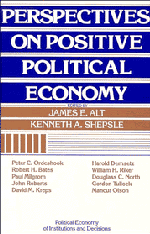Book contents
- Frontmatter
- Contents
- List of contributors
- Series editors' preface
- Acknowledgments
- Editors' introduction
- PART I THE NEW POLITICAL ECONOMY
- PART II ORGANIZATIONS, TRANSACTIONS, AND OPPORTUNITIES
- PART III REFLECTIONS ON THEORETICAL FOUNDATIONS
- 6 Political science and rational choice
- 7 Institutions and a transaction-cost theory of exchange
- 8 The costs of special privilege
- 9 Toward a unified view of economics and the other social sciences
- Notes
- References
- Index
8 - The costs of special privilege
Published online by Cambridge University Press: 05 July 2011
- Frontmatter
- Contents
- List of contributors
- Series editors' preface
- Acknowledgments
- Editors' introduction
- PART I THE NEW POLITICAL ECONOMY
- PART II ORGANIZATIONS, TRANSACTIONS, AND OPPORTUNITIES
- PART III REFLECTIONS ON THEORETICAL FOUNDATIONS
- 6 Political science and rational choice
- 7 Institutions and a transaction-cost theory of exchange
- 8 The costs of special privilege
- 9 Toward a unified view of economics and the other social sciences
- Notes
- References
- Index
Summary
The first time I saw Milton Friedman was at a public debate on free enterprise versus socialism at the University of Chicago. He based his entire lecture on what a benevolent dictator would do. Admittedly, he intended this simply as a rhetorical device to argue for a free economy. Of course, Friedman himself was not in favor of a dictatorship. He was, however, using a benevolent dictator as a means of avoiding all discussion of politics.
In this, he was typical of the economists of that time. They investigated optimal policies and considered what well-intentioned people would do if they had control of the government. Insofar as they had an argument for this approach, it was based on the division of labor. They would have said that politics was best left to political scientists. As a matter of fact, political scientists were not doing very well with politics, essentially because they lacked the tools that economists had. Public choice is, in the real sense, the use of economic and economiclike tools developed for special application in a field that political scientists traditionally taught.
Let us turn to the more scientific aspect of public choice. I am going to give an example of the kind of work we do. This example is particularly interesting because it is a case in which for some two hundred years economists were simply wrong.
- Type
- Chapter
- Information
- Perspectives on Positive Political Economy , pp. 195 - 211Publisher: Cambridge University PressPrint publication year: 1990
- 18
- Cited by

